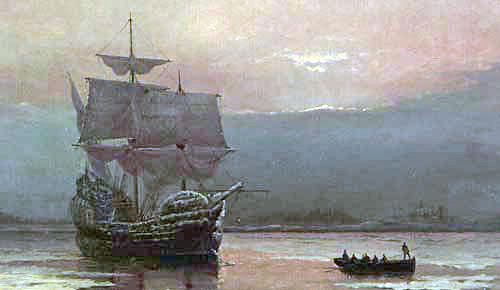Difference between revisions of "Mayflower DNA Project"
(→Project dashboard: start "news" page) |
(moving "Project status summary" to separate "News" page) |
||
| Line 29: | Line 29: | ||
*Use the results to aid in genealogical research associated with the Mayflower passengers and crew, including tracing ancestry further back within England, Holland, etc. | *Use the results to aid in genealogical research associated with the Mayflower passengers and crew, including tracing ancestry further back within England, Holland, etc. | ||
**testing related lineages that stayed in Europe can be particularly helpful here | **testing related lineages that stayed in Europe can be particularly helpful here | ||
| − | |||
| − | |||
| − | |||
| − | |||
| − | |||
| − | |||
| − | |||
| − | |||
| − | |||
==Contact us== | ==Contact us== | ||
Revision as of 03:39, 19 September 2016
Project dashboard
- News
- Results:
- Y-DNA (direct paternal lineages)
- mtDNA (direct maternal lineages)
- autosomal DNA (not yet started)
- About the project
- How you can help
- Project finances
Project summary
The Mayflower DNA Project is using cutting-edge genetic genealogy research based on testing of modern descendants of passengers and crew of the Mayflower's 1620 voyage. The project aims to achieve the following goals:
- Help resolve unanswered questions about the ancestry and genealogy of the passengers and crew of the Mayflower
- Create a resource to help modern individuals better understand their connections to Mayflower passengers and crew through genetic genealogy tests
We aim to complete the first phase of the project by the upcoming quadricentennial of the 1620 Mayflower voyage in 2020 (five years from project launch).
Methodology
Although the project ultimately plans to use all three types of genetic genealogy test results (Y-DNA, mtDNA, and autosomal/X DNA), the focus of the first phase of the project will be on using advanced Y-DNA tests to characterize the paternal lineages from the Mayflower. For each paternal lineage, we plan the Y Elite test from Full Genomes Corporation for at least one direct patrilineal descendant, followed by tests of individual genetic markers (identified from Y Elite testing) in additional participants through YSEQ. For each surviving paternal lineage from the Mayflower, this will provide the most comprehensive Y-DNA profile that is possible with current commercial genetic testing technology. When available, we will make use of prior genetic genealogy research related to these lineages (e.g. Y-STR test results) to provide supporting evidence and to guide project recruitment.
Through this approach, we aim to achieve the following objectives:
- Place the Mayflower passengers and crew into the broader human Y chromosome tree by determining high-resolution haplogroups for individual paternal lineages
- this can help provide a demographic-level picture of the ancestral origins of the groups comprising the 1620 Mayflower voyage
- these efforts will also likely aid in more general research of the human Y tree
- Identify unique, stable genetic markers for individual paternal lineages
- in some cases, it may be possible to identify one or two markers that confirm patrilineal descent from a single individual from the Mayflower
- Use the results to aid in genealogical research associated with the Mayflower passengers and crew, including tracing ancestry further back within England, Holland, etc.
- testing related lineages that stayed in Europe can be particularly helpful here
Contact us
Project administrators may currently be reached at mayflowerdna![]() gmail.com .
gmail.com .
External links
- International Society of Genetic Genealogy
- General Society of Mayflower Descendants
- "Mayflower" article on Wikipedia
© 2015 mayflowerdna.org All Rights Reserved
